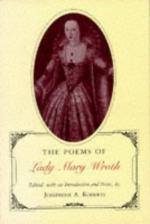|
This section contains 5,014 words (approx. 17 pages at 300 words per page) |

|
SOURCE: "Mary Wroth and the Invention of Female Poetic Subjectivity," in Reading Mary Wroth: Representing Alternatives in Early Modern England, edited by Naomi J. Miller and Gary Waller, The University of Tennessee Press, 1991, pp. 175-90.
In the following excerpt, Feinberg explores Wroth's innovative use of a female perspective in Pamphilia to Amphilanthus and her evocation of "a fictional audience of women readers and writers."
The nature of women's writing was clearly at issue early in the seventeenth century. Remember Rosalind's response to Phoebe's verses: "I say she never did invent this letter, / This is a man's invention and his hand" ([William Shakespeare, As You Like It,] IV.ii.28-29). She insists that "women's gentle brain / Could not drop forth such giant-rude invention" (IV.iii.34-35). While Rosalind as Ganymede speculates about how a woman's writing might sound, the work of feminist scholars confirms the range of women writers...
|
This section contains 5,014 words (approx. 17 pages at 300 words per page) |

|


